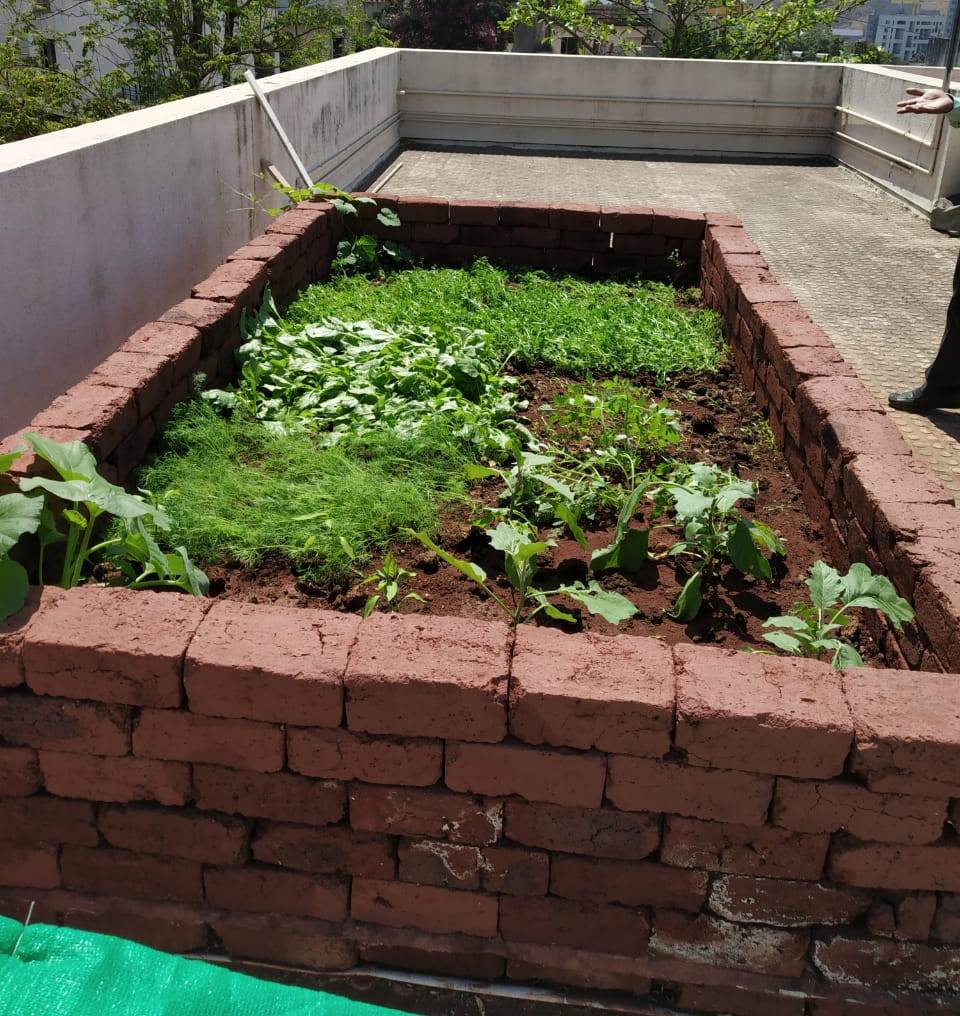Ordnyanic – wisdom of the soil…
Ordnyanic is one of our silent but most loved project. The first time I visited this project was with my teammates who had been driving this project since its inception. A team had been working to and fro from office to client locations throughout the week when they sent the office team pictures of tiny methi blooms. This was our prototyping site and all of us had been eagerly waiting for these babies to sprout. It was set up on the terrace of Mr Yogesh Joshi in a 10x5x2 plot made on the terrace with bricks and Organic material. As we climbed up-to the terrace the afternoon sun shone and there in the plot stood a 100 tiny methi babies smiling up at the sun. Site team had also planted Palak, Gourd, Beans, Coriander and a few other vegetables which had also begun to show through the dark soil and we stood looking at them, mesmerized, at what a few seeds, soil, water and nature can do.
 Ordnyanic started a few months back but its ideas have been giving us sleepless nights since a few years. The Green Revolution in the late 1960s resulted in the adoption of newer technologies like use of high-yielding varieties (HYVs) of cereals, chemical fertilizers and agro-chemicals, controlled water-supply, new methods of cultivation and mechanization. While the increasing demands of agriculture produce were by and large taken care by the green revolution, usage of chemical fertilizers and agro-chemicals in uncontrolled amount become a common norm of conventional farming system. All these practices superseded ‘traditional farming’ and traditional farming methods started taking a back seat. The green revolution gave us enough food to feed our population but it also led us to the forget our age old wisdom, our nature dnyan. Somewhere in a race to overproduce we ended up spoiling the water in our rivers and turned our land barren with fertilizers and pesticides. We flooded markets with hybrid and processed products that inversely affected our health and life.
Ordnyanic started a few months back but its ideas have been giving us sleepless nights since a few years. The Green Revolution in the late 1960s resulted in the adoption of newer technologies like use of high-yielding varieties (HYVs) of cereals, chemical fertilizers and agro-chemicals, controlled water-supply, new methods of cultivation and mechanization. While the increasing demands of agriculture produce were by and large taken care by the green revolution, usage of chemical fertilizers and agro-chemicals in uncontrolled amount become a common norm of conventional farming system. All these practices superseded ‘traditional farming’ and traditional farming methods started taking a back seat. The green revolution gave us enough food to feed our population but it also led us to the forget our age old wisdom, our nature dnyan. Somewhere in a race to overproduce we ended up spoiling the water in our rivers and turned our land barren with fertilizers and pesticides. We flooded markets with hybrid and processed products that inversely affected our health and life.
The current generation also faces another problem of waste management. We see that the population congestion has lead to expansion of cities for human settlements but little has been done to tackle the problem of garbage that this population has been generating. The dump yards are going further and further away from the city residential areas which has increased the garbage transportation costs. Segregation and handling of this never ending garbage has overwhelmed the local authorities as well . Though the government has been promoting wet garbage composting within the society limits few have been following through. Lack of knowledge, fear of foul smell within residential premises, fear of rodents and other animals have been few of the reasons why people are not composting their own wet garbage. A Household survey revealed that average quantity of kitchen waste generated per day in a household was 0.144 kilogram of raw food, 0.252 kilogram of vegetable peels, 0.080 kilogram of used/left-over food, 0.221 kilogram of fruit peelings,0.042 kilogram of used tea and coffee powder, 0.086 kilogram of egg and coconut shells and 0.044 kilogram of bone and meat waste. However only eight per cent of the households were practicing composting/ vermi composting methods and the rest 92 per cent homemakers mismanaged the waste. Pune generates around 1600 tons of Solid waste per day and Garden waste generation is around 50 to 60 TPD(tons per day)
Kitchen gardening can be said to be a solution for both the problems stated above. Composting your own wet garbage and further using this to grow your own food is in true sense a Midas touch. This is like reawakening our nature dnyan and letting nature take its course. Nourish the land and in turn get food that nourishes us and set up a sustainable cycle to restore nature and our harmony with the surroundings. ‘Atma Nirbhar bano’ is the current slogan and what better way than to start composting and kitchen gardening?

With these things in mind Ordnyanic started after many discussions and planning. The ‘dnyan’ symbolises the wisdom of the soil, wisdom of nature that we seldom forget. We created this prototype to fine tune our methods and test our theories and knowledge. We organised meet ups and knowledge sharing sessions with societies and individuals to share methods and best practices to compost and handle wet garbage. We tried to put to rest the misunderstandings and fear many people have regarding composting. We also studied the patterns and layout for growing vegetables with the help of farming experts on our team. How to make a plot, the irrigation methods, the layout of sowing of vegetables, the preparation of soil, maintaining our composting pit and using it effectively were studied and also used while prototyping. We fine tuned each activity to make it more efficient for an urban population and suit the urban needs. Site team spent many an hour, getting their hands covered in muck to literally pull out gold. With the recent lock-down due to Covid-19 some of our project had to be left unattended but that was when we really understood its full potential and Impact. When groceries and vegetables were scare in the market due to lock-down, our clients called in to say that the kitchen gardening plot had literally saved them. With easy access to fresh vegetables throughout the lock-down, their lives had become so much more easy.
Ordnyanic is a yearly project and you can enroll anytime throughout the year. This is an yearly paid model. We are currently catering to servicing and maintaining bungalows in Pune and going forward we will also set up projects in housing societies, commercial complexes as well and other institutions. A little sunny spot is all we need. Terraces work well. Team Ordnyanic will visit the site and form a project plan for the site. This will include plan for setting up the farm beds, which seeds to sow, which crop to take, setting up irrigation etc. There will be regular site visits by both our site experts and also our coordinators so that any site specific issues can be resolved immediately. Right from creation of the plot to getting the output everything will be managed by team Opash. Seeds, fertilizers, pesticides all will be organic in nature and no chemicals will be used. The project is estimated to save about rupees 2500 to 3000 for a family of 4 on a monthly basis. What is better than saving money and also getting healthy farm fresh produce in your own backyard?
What started as a small idea in Opash’s backyard is now slowly and steadily blooming into something bigger and wonderful. Just like nature this is a silent project, working in the background creating a community that is not only self sustainable, self reliable and healthy but also truly dnyani. To be a part of this revolution give us a call.
For queries suggestions or just to have a look at our wonderful plots ring us at +91 7757066638/ +91 9890418259 .
Keep spreading the sunshine!

Mr. Yogesh Joshi also shared his view…
 Mr. Yogesh Joshi – Kitchen Gardening Feedback
Mr. Yogesh Joshi – Kitchen Gardening Feedback
I am Software Engineer by profession having a passion for kitchen gardening and growing own organic vegetables at my garden which will be easily accessible for us. Few days back I met my friend Ameya Joshi, who introduced me to his company Opash Socio Commercials Pvt Ltd, a company of highly spirited young minds working as a catalyst to development sector to achieve sustainability in each project. He explained to me a service started by company – Kitchen Gardening in bungalows with all expertise that is needed. He and his team explained to me the concept of Kitchen Gardening and the process of how it shall be implemented at my place. I liked their perspective about organic residue free vegetables and kitchen waste management. And most importantly, to implement this idea at my place all I needed was open space to grow veggies and pit to collect kitchen waste (I already had a pit which was not in working condition). Initially his team came to my house with prior appointment, explained us the process, convinced me how it is useful for my family, understood our vegetable choices and our needs. Opash team is very professional and have managed each step with utmost planning and details. On our approval to the idea and go ahead from family we signed a MOU with Opash. We were given a file which consisted complete set of documents of attendance sheet of gardener, task and observation sheet and veggie produce sheet. This gave us clear idea about what will be the process. What I appreciate most is their systematic approach and their dedication towards work which they have undertaken. Once the garden was planted we started receiving the produce which was fresh, organic and home grown. Amidst the Covid-19 crisis, most of people were facing the problem to procure veggies and even if we got it we were skeptical about its quality and hygiene. But I am happy to say that from past three months we are using vegetables from our mini farm. It is named as “Ordnyanic” by team. Every week we get two bunches of green leafy vegetables and half kg of big brinjals, tomatoes ,green chilies. Our decision for doing kitchen gardening has helped us at the time of lock-down. Thanks To the Team Opash during the pandemic situation we could utilize these vegetables and avoid going out. My best wishes to Team Opash as they are doing phenomenal job. Have suggested to add the drip irrigation system, as it will ease out the burden of watering whenever we are out of station. I sincerely request everyone to try this new concept at their homes with a paid and professional activity which is done with proper sanitation and hygiene.
All the best.


